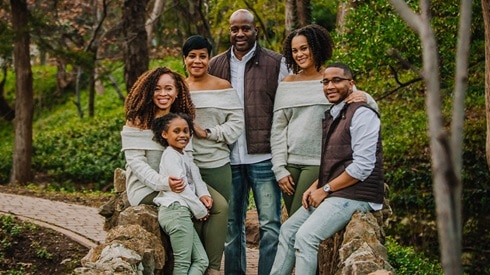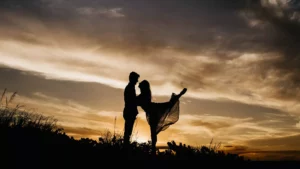“Yes,” she said. “There is something wrong. You know I watch the coverage. People are shooting at police — shooting up police cars — and you’re out there on the front lines walking without your vest?”
On that fearful night, Lori pulled her husband close, and they held each other tight.
Eleven days earlier, on Aug. 9, African American teenager Michael Brown Jr. had been shot to death by white police officer Darren Wilson in Ferguson, Missouri. His death ignited an outcry against racial injustice throughout the nation. Protesters marched through Ferguson by day, and rioters wreaked havoc each night.
Where other law enforcement officials had tried to beat down the tensions in Ferguson using riot gear and armored vehicles, Johnson — himself an African American — instead reminded officers and protesters alike what they had in common. Each of them was someone’s child or parent, brother or sister, husband or wife.
Amid violence that threatened to pull the community apart, Johnson’s family clung to their faith and to one another, even as they asked tough questions and struggled to find courage. “Faith keeps us going forward,” Johnson says, “and lets us know there’s always a better tomorrow.”
Questions but no easy answers
Then his 21-year-old son, Bradley, asked, “Dad, what if that was me? What would you say?”
The words pierced Johnson’s heart. “I began to ask myself, What if that were my son?”
For Johnson, that moment became a lesson in parenting. “As parents,” he says, “we see ourselves as the teachers for our kids, to provide them wisdom throughout their lives. We try to hold on to our kids as long as we can and see them as kids.” But in that moment, he began to see his children as young adults, and they tested him to re-evaluate his role as an officer of the law. Johnson couldn’t ignore the questions raised by Brown’s death.
If he didn’t do everything he could to make Ferguson better, Johnson told his children, then who’s to say they wouldn’t one day suffer as the Brown family was suffering.
Bradley says his father “had to show the world that an African American police officer can exist in this world, that a good police officer can exist in a city that thinks all are bad. And he had to show them that every police officer has a heart, and the vast majority are good officers, good people.”
Bringing change
Johnson told the press, “We are going to have a different approach, the approach that we are in this together.”
We’re in this together
Johnson had no answers to give.
“Some of those things you’re asking me,” he said, “I don’t have a why. I don’t. But I want to tell you, when you say ‘speak for us,’ you know what us should be? I know you don’t believe it today, but us should be all of us. Not two counties. Not two Missouris. Not two United States. All of us.”
“We have to find value in each other,” Johnson says, reflecting on the incident. “Too often, we think we’re so different from one another, but if we just bring it down to the very core, we’ll find that we’re really alike.”
“All of us” included Johnson’s family. Especially as violence increased on the streets of Ferguson and morale declined among his officers, he looked to family for support.
“We were a part of this,” Bradley says. “We knew that we had to rely on each other and support him. We became closer and required nothing of him when he got home.”
And Lori became “the rock that our family leaned on,” Johnson says. Even on fearful nights when rioters shot at police vehicles and when Johnson rushed down Ferguson’s streets without a bulletproof vest, she was a constant source of support.
During those 13 days of crisis five years ago, Johnson experienced the pain of being caught between the Ferguson community and his fellow law officers. He remembers getting on his knees, praying, “God, I’m all alone.” At that moment, he sensed God say, “You’re not alone. You just have to understand who’s with you.”
On one particularly rough morning, Johnson’s daughter, Amanda, sent him a text message to draw him back to his faith. “Remember, Daddy,” she wrote, “when Peter failed, Jesus picked him back up.” Johnson would reread that text often to remind himself that he wasn’t alone; his God and his family were with him.















